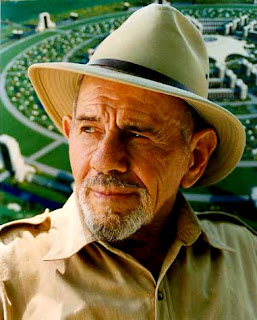Jacques Fresco's Futurism
There few American inventors like Jacques Fresco. He has spearheaded almost a full century of architectural and social advancement by way of new inventions and new ways of looking at the world. Fresco thinks through problems as small as the utilitarian design of a shower head or a medical device and as large as rocket science and civil engineering.
Fresco's quasi-utopian cityscapes and building designs are crafted with an eye toward simultaneity with nature. His targets are poverty, war and crime. His goal is the advancement of human civilization and the transition from a money based economy to a production and resource based economy, wherein machines do the grunt work and humans are left to loftier pursuits. Due to the severity of his views, and his Atheistic, practical approach to solving problems, Fresco is seen as the Anti-Christ by some. His futurism is guided by what one might refer to as the 'anti-faith based approach.' If something goes wrong, don't pray for God's mercy the next time it happens. Solve the problem to ensure it doesn't happen again.
As you gaze over the spare, aerodynamic sweep of Fresco's vehicle and building designs, it comes as no surprise that he helped develop models for numerous science fiction illustrations and films in the 1950s. It should also be noted that, about sixty years before Nintendo's 3DS, Fresco invented glasses-free 3D technology, pioneered monorail concepts, high speed rail, fluorescent lighting, and many other technological advancements. The sheer magnitude of his contributions to twentieth (and 21st) century thought about the future is incalculable.
The circular, nature-inspired shapes of his future cities make one thing very clear - Fresco's aim is not so much to change the world in one bold stroke but to introduce new ways of thinking that invariably do change the world.
Fresco has caught flack for advancing ideas that would not be out of place in a show like Star Trek: eradicating the need for money, sharing resources, allowing machines to make decisions about resource allocation and environmental stewardship based solely on gathered empirical data. Critics claim that Fresco's core concepts resemble Communism, or Socialism, or even Fascism. Fresco always responds by not buying into the connotative hysteria associated with these labels. His futuristic vision eschews the regimented anti-individualism that many have come to associate with socialist contracts.
But more importantly, it is the job of a futurist to push our notions of what we can become to its utmost limits, whilst staying in the realm of plausibility. In the fantastic documentary on Fresco, he cautions against thinking too far ahead in the future, for 'there are things we just don't know yet.' That he tempers his vision with flexibility is perhaps the greatest sign that his futurism holds promise. His ideas for production and design are not theoretical, pie-in-the-sky flights of fancy, but applications of existing production methods evolved on a broader scope, for a larger stage.
If one stacks Fresco's vision against our current hegemony - our banks, our power structures, our institutions, our faith and gut propelled Stock Market, our inefficient disaster preparedness mechanisms, our incalculable human suffering - it may seem to some that he's bought into some naive pipe dream that may never come true. He may seem like a crackpot without a leg to stand on. His Venus Project, a compound / amusement park (of sorts) in Florida may come across as a kind of water spout for Socialist dribble. But looking over the decades of minute advancements that Fresco has made, it's evident that he isn't all talk. He's already made a difference. He is already to be taken seriously. Hearing him speak about his ideas makes it very clear that Fresco has considered all the angles. He is no radical, but rather an evolutionary thinker who always, always leaves the door open for course correction from a core idea if it proves untenable.
He may propose a system wherein custom structures are pushed out and added to existing structures as its residents' needs evolve (witness the above apartment stem for one such example), but Fresco is not proposing the same engineering feats for pushing out humans or their purpose.
Jacques Fresco's futurism is intensely humanistic, taking stock in the need for each individual to chart his or her own course. While it is true that his loftiest goals for society - through invention and innovation - apply the scientific method to all of society, look closer and see that he has grand respect for the arts, for drama, for scholarship and reading, for leisure, for meaningful intellectual and philosophical discourse. Fresco may utilize the scientific method in spearheading his grand views for society, and for the designs of his buildings and devices, but his underlying faith in humanity's propensity for advancing itself through art leads his imagination. His methodology may be guided by mathematical and scientific principles, but his lifetime of innovation comes from a deep seated desire to witness humanity's ascension to something much greater than it is now.





Comments